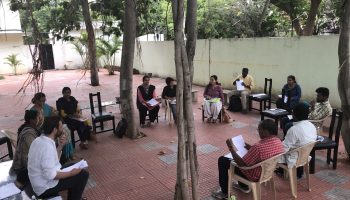As researchers are the central instruments in ethnographic research, a great deal of data collection depends on how far he/she creates meaningful relationships with the study participants (Coffey, 1999). These relationships are not static but fluid, and they are essential to gain access to the respondent’s social world (Mason, 2002). Field relationships can determine the depth and authenticity of data that we collect from the field. As we do research with children in the family setting, we are expected to develop a range of relationships, especially with two extremely different groups – children and adults – but also with siblings, for both data collection and the smooth conduct of our fieldwork. Over time, our purposeful formal relationships with children and their families are converted into informal and friendly relationships. At times, as I illustrate below, banter finds a place in our data collection, which I consider not such a bad thing in research, after all.
My colleague Madhavi and I reach Asha’s house around 2.30 pm on a Saturday afternoon. It is our fourth visit to Asha. Her house is in the far corner of the university campus so the place is very quiet. We get off from the taxi and start walking. The main door of the house is ajar. We knock on the door and while waiting outside we remove our shoes by the door. In a minute, Asha’s mother pops out. She flashes a smile and asks us to get in. We exchange pleasantries and make general enquires. It’s been more than five months since we met the family last time. We had been in touch with the family through phone calls and WhatsApp messages since our last visit though.
After hearing our movement and voice, Asha comes out to the veranda from their living room. Asha seems to be grown up a bit and lost couple of tooth too. We sit out on the teak wood sofa in the veranda as usual. Asha sits in between us.
Once we begin our conversation, I start scribbling notes in a scribbling pad. Asha looks at my scribbling pad and frowns upon it. It is funny but also embarrassing for me the way she looks at it. She is still staring down my scribbling pad in incredulity. Madhavi is laughing out loud with her gesticulation. Then, Asha asks me, ‘is it English or what, it looks like Urdu’. Madhavi joins her saying sarcastically ‘very beautiful handwriting, isn’t it? Asha laughs and says that it looks very small and she can’t read it. Madhavi continued: ‘may be Anna (brother) needs to practice cursive writing (laugh)’. Asha goes on saying that ‘my sister (she calls her aunty as sister) also writes like you (laugh)’.
Her mom comes out after hearing the burst out laughing. She has curiosity in her face. Madhavi apprise her of what had happened. She smiles but with a hint of disapproval in her face. She might have thought it must be discomforting for me. Asha didn’t stop there. She goes inside to her father’s reading room and comes out with a magnifier in her hand. She starts looking at my handwriting with the magnifier. Madhavi couldn’t control her laugh and then says ‘you can’t read even with the magnifier’. Asha replies to Madhavi: ‘I still can’t read it, finding it too difficult to read (giggles)’
Asha’s mom is not in complete agreement with Asha’s playful act but she didn’t say anything since I didn’t show any uneasiness in my face. After pulling my leg, Asha goes inside to take the magnifier back.




Pingback: Photo/stories from the field: portrait of an ethnographer·